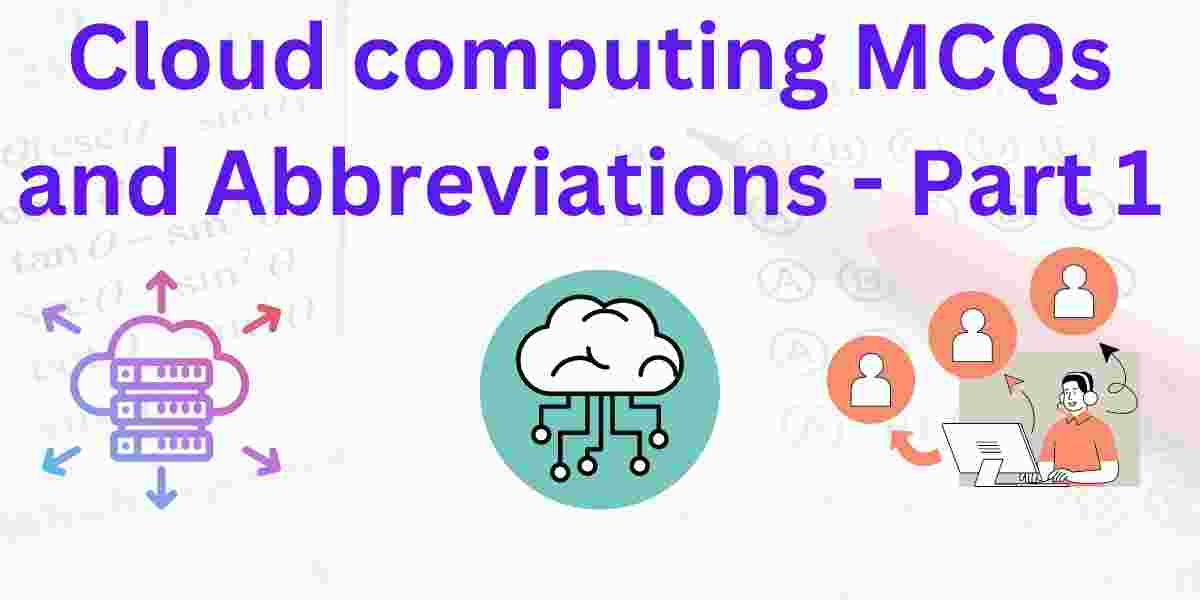14 Abbreviations and 8 multiple choice questions (MCQs) on Cloud Computing MCQs and Abbreviations that will of help to you to increase your knowledge in cloud computing field. These questions and abbreviations will be of in increasing your knowledge for your college exams, engineering related entrance examinations etc.
Note: This is not our first article in this topic, there are few other topics like
| Cloud computing MCQs and Abbreviations – Part 2 | Cloud Computing Solved Question Paper |
| Cloud Computing Solved Question Paper & Question Bank | High availability and disaster recovery in cloud computing |
Table of Contents
Multiple Choice Questions / Abbreviations on Cloud Computing
Full Forms / Abbreviations:
Let’s start with few abbreviations or short notations used in cloud computing field:
- HPC – high performance computing,
- HTC – high throughput computing,
- GPS – Global positioning system,
- RFID – Radio frequency identification tag,
- IOT – Internet of things,
- VM – Virtual machines,
- SLA – Service level agreements,
- ROI – Return on investment,
- TCO – Total cost of ownership,
- WS – Web services,
- QoS – Quality of service,
- SaaS – Software as a service,
- API – Application programming interface,
- REST – Representational State Transfer.
Benefits of cloud computing:
- Reduction in IT related cost for consumers,
- Good services at low cost,
- Easy scalability whenever required,
- Better operational costs,
- Increased efficiency,
- On demand accessibility etc.
MCQ Section:
Q1. Which among the following is correct regarding benefits of cloud computing?
A. Highly scalable
B. Highly available
C. Both a and b
D. None of the above
Ans. C i.e. It is both highly scalable and available.
Q2. Is it possible to upgrade machine to higher configuration machine in cloud computing easily?
A. Yes
B. No
Ans. A. Yes i.e. one can anytime upgrade their machines to a new one anytime.
Q3. Out of the following mentioned options which are the benefits of virtualisation?
- Less energy consumption,
- Less infrastructure and maintenance cost and
- Balanced workload
Options:
A. 1 and 2
B. 2 and 3
C. 1 and 3
D. 1, 2, 3
Ans. D i.e. all the mentioned points are benefits of virtualisation.
Q4. Main application of high-flux computing is in:
A. Internet searches
B. Web services
C. Both A and B
D. None of the above
Ans. C. Both A and B
Explanation: The main application for high-flux computing is in Internet searches and web services by millions or more users simultaneously.
Q5. Goal of HTC is to:
A. High number of tasks completed per unit time
B. Optimal number of tasks completed per unit time
C. Least number of tasks completed per unit time
D. None of the above
Ans. A. High number of tasks completed per unit time
Explanation: HTC performance goal thus shifts to measure high throughput or the number of tasks completed per unit of time.
Q6. In distributed system each computer has its:
A. Shared memory
B. Own private memory
C. Partially shared and partially private
D. All of the Above
Ans. B. Own private memory
Explanation: A distributed system consists of multiple autonomous computers, each having its own private memory, communicating through a computer network.
Q7. In distributed system computers communicate through:
Ans. A computer network i.e. a distributed system consists of multiple autonomous computers, each having its own private memory, communicating through a computer network.
Q8. What is the purpose of VM (virtual machine):
A. Better resource utilisation
B. Sharing resources among many users
C. Improved computer performance
D. All of the above
Ans. D. All of the above
computer users gained access to much enlarged memory space when the concept of virtual memory was introduced.
Conclusion:
I hope that this article is of some help to you and helps you in improving your knowledge related to cloud computing. Do let us know your thoughts and if you want us to cover any other topic.
Thanks.
Source of information:
FAQs
Q1. Data integrity means data is:
Ans. Complete and consistent.
Q2. Private clouds are built specifically for?
Ans. For internal use of an organisation to support its business operations.
Q3. Full form of SAN?
Ans. Storage area network.
Q4. Amazon S3 full form?
Ans. Amazon Simple Storgae Service.

1 thought on “MCQs and Abbreviations – Cloud Computing”